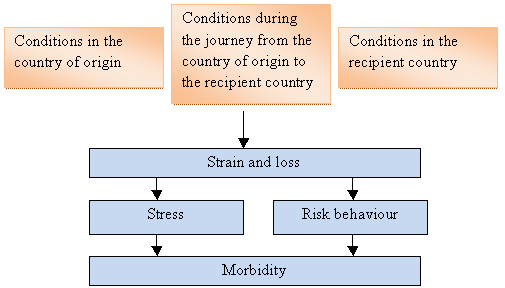What do we know about health and social implications of migration?
Speaking of human movement, migration consists of moving from one region to another. The number of international migrants has increased rapidly over recent years, reaching 244 million in 2015. (UN Department of Economic and Social Affairs).
There are varieties of reasons triggering migration; they can be classified into 2 categories:
Coercing factors
Civil wars or internal conflicts
Hunger-famine
Poverty
Political instability
Economic crisis
Natural disasters
Social injustices(discrimination, racial tensions, hate crimes)
Personal reasons
Job opportunities
Academic/education
Personal fulfillment
Better life
Health
Tourism
As shown in the diagram below, the migration process can involve a number of stressors and constraints factors increasing the likelihood of morbidity.
The influence of the migration process on migrant’s morbidity.

Source: Kristiansen et al, 2007
Other parameters to be taken into consideration are language barriers in the host country, lack of info about healthcare and other services, loss of status, marginalization, struggle as related to assimilation, identity crisis, lack of social network, discrimination, etc...
The health implications of these factors can be detrimental to the mental and physical health of migrants. Coping with a completely new environment can be emotionally and physically stressful( from being depressed, to be discouraged, and physically drained and stressed out).
Though migrants are often young, some may have preexisting health conditions
that can be strenuous for the local health care system( especially when dealing with massive migration).
Other challenges may speak for the necessity to increase healthcare infrastructures and health coverage for new migrants once they arrive in the host country. When dealing with aging migrants, there may be challenging questions to answer: how to resolve health coverage for the elderly, retirement, and taxpayers.
Migration also presents health implications for the country where migrants came from. The departure of migrants for economic or academic opportunities may consequently create brain drain ( fuite des cerveaux) in their country of origin- especially those who are skillful in tech, engineering, medical, and entrepreneurial. That human depletion is an impediment to the local economy because human potential is being lost.
The World Health Organisation (WHO) has long recognized that migration of health personnel from developing to developed countries increases the existing imbalances in the global health workforce and can cause deficiencies in local provision of services in developing countries (Mejia et al, 1979).
References:
- Kristiansen M, Mygind A, Krasnik, A (2007). “Health effects of migration”.Danish Medical Bulletin 2007;54:46-7.
- Mejia A, Pizurki H, Royston E: Physician and nurse migration: analysis and policy implications. France, World Health Organisation; 1979:xiii-476.
- United Nations Department of Economic and Social Affairs Population Division. International Migration Report 2015: Highlights. http://www.un.org/en/development/desa/population/migration/publications/migrationreport/docs/MigrationReport2015_Highlights.pdf


No comments:
Post a Comment